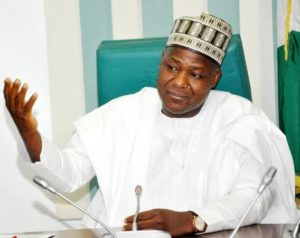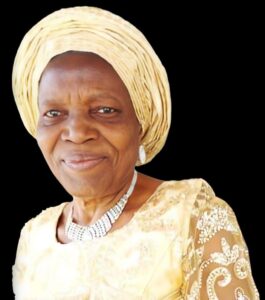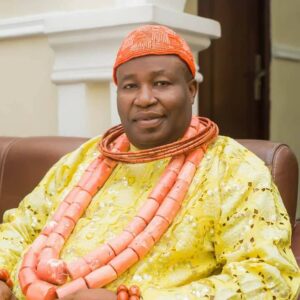ON NIGERIA LAWMAKERS QUEST TO GRANT IMMUNITY TO ITS PRINCIPAL OFFICERS
By Zik Gbemre
We find it appalling that members of the House of Representatives have been sharply divided over a proposal to amend the Nigerian Constitution to confer immunity on the Presiding Officers of National and States Houses of Assemblies. The situation has even led to recently reported rowdy session by the Federal House of Representatives. The proposal came against the backdrop of the trial of the Senate President, Dr. Bukola Saraki, and the Deputy Senate President, Ike Ekweremadu, over alleged forgery of the Senate Rules at the Federal High Court, Abuja.
It was gathered that the proposal which came in form of a Bill for an Act to alter section 308 of the Constitution of the Federal Republic of Nigeria, 1999 (as amended) and for other related matters was sponsored by the House Minority Leader, Leo Okuweh Ogor. The bill specifically seeks to amend section 308, sub-section 3 to include the Senate President, Speaker and the Deputy Speaker of the House of Representatives as well as Speaker and the Deputy Speaker of a State House of Assembly who are Presiding Officers of the Legislative Arm of Government at Federal and State levels. Those who spoke in support of the bill, included Ossai Nicholas Ossai (Ndokwa East, Ndokwa West, Ukwuani: PDP; Delta).
Though, the House Leader, Femi Gbajabiamila, had faulted the initiative on the basis that it was coming at a wrong time, we also could not help but wonder why these lawmakers are bent on amending the said immunity clause to shield them from what exactly? Gbajabiamila said the timing would send wrong signals to the electorate who might assume that the Bill was out to constitute a clog in the wheel of the on-going fight against corrupt practices in the polity.
He argued: “We are here to legislate; we are here to represent our people. If we pass this bill, will the people support it? I do not know of any country where the legislature is shielded from prosecution. Let us make laws that will endure. Let us not make laws based on situations that arise.”Aliyu Madaki who spoke in support of Gbajabiamila suggested that the bill be thrown out.
With regards to the recent rowdy session over this issue, it happened that the Speaker, Yakubu Dogara, stirred up the hornet’s nest when he attempted to refer the Bill to the Adhoc committee on the review of the constitution as against adhering to the conventional practice of subjecting it to voice vote, which would have enabled the lawmakers to decide the fate of the proposed amendment. Protagonists of the bill openly canvassed support for the Speaker’s action while its antagonists expressed preference for the voice vote. The Bill enjoyed the support of members of the opposition Peoples Democratic Party (PDP) and members of the ruling All Progressives Congress (APC) not predisposed to the on-going trial of the Senate Presiding Officers.The situation held up proceedings for about 30 minutes before Dogara could restore orderliness, and then adhered to the counsel of the Vice Chairman, House Committee on Rules and Business, Bode Ayorinde, who argued that it was appropria te to refer the bill to the Adhoc committee on the review of the Constitution without necessarily going through the procedure of a voice vote.
Let us reiterate and pin-point here that the said proposal, which was made by the PDP minority leader Leo Ogor, was in line with what the Upper Chamber of the National Assembly had earlier proposed. However, in the Upper Chamber (Senate), there was no opposition to it by APC Senators. One then begins to wonder why were APC members in the Lower Chamber against the immunity proposal? Was there anything they are seeing or have seen that their counterparts in the Upper Chamber have not seen? Perhaps only time will tell.
The issue of immunity clause has always been a very sensitive topic whenever being discussed in the Nigerian polity. The bone of contention has always been for, and against the removal of this clause from the country’s constitution. But the number of Nigerians calling for its removal in recent times appears to have increased. This was the common thread that ran through meetings organized by the immediate past 7thNational Assembly in different parts of the country, some months back, in respect of the review of the 1999 Constitution. At most town hall meetings back then, the immunity clause for Governors, President and Vice President dominated the talks. There was more consensus agreement from stakeholders regarding the removal of the immunity clause than other issues that were discussed.
A lot of Nigerians and various stakeholders and government representatives, have unanimously called for the removal of the immunity clause on Governors, Presidents and their Vices, as it relates to criminal prosecution. And now, we wish to include that those at the National Assembly also do not deserve such privilege. Many Nigerians like us, have argued that this would discourage Governors and those at the Federal level from looting the public treasuries in their domain. The case of former governor of Delta State, James Ibori, and his cousin Dr. Emmanuel Uduaghan, are classical good examples of what we are saying here. These former Delta State Governors used the so called immunity clause to grossly abuse their offices by misappropriating and misusing public funds with reckless abandon and impunity.
It is a known fact that those in Power have over the years, abused the immunity clause by looting public funds with reckless abandon and impunity. Often time, it is after the Governors, Presidents and their Vice, have left public Office that Nigerians are bewildered with the public funds-plunder and financial atrocities committed by the Executive Government while in their offices. What makes it worst is the fact that once they have left office, it takes a ‘miracle’ for the anti-graft agencies and the judiciary to bring them to book and make them pay back what they have stolen from the State and nation. There are many former governors that are like that today, walking free despite the huge corruption charges on their head. The Ibori case was different simply because it was a London Court that made him face justice for the atrocities he had committed against his home State – Delta. Whereas, our Nigerian Law Courts found him not guilty. It is in the face of all these that we support the call for the removal of the immunity clause from the Nigerian Constitution.
Those who are arguing for the retention of the immunity clause seriously do not have the interest of the country at heart. This school of thought are arguing that the immunity clause should be retained in the statutes so that administrators will not be faced with unnecessary distraction like going to Courts. They also argued that if the immunity clause is removed, government would waste a lot of resources on litigations. For us, this argument does not hold water because going to court or not should not in any way distract a government from doing what is expected of it. More so, when a political leader is overwhelmingly elected by the majority of its populace, the issue of election litigations would not arise in the first place because those involved in such an election would see that their opponent won the election fair and square. Election litigations only arise when there is a foul play in the election results, which we often witness in Nigerian electi ons, especially at the State levels. The same thing applies to corruption cases. If an Executive Government is doing what is expected of it in the management and judicious use of State funds under their care as custodians, there will not be need for anybody to want to take them to Court to answer any corruption case.
However, in as much as this call for the removal of the immunity clause is a step in the right direction, going by the prevailing circumstances with the Executive and Legislative Arms of the Nigerian government; we still believe the present Nigerian Constitution as it is, does not necessarily need so much reviewing and amendment for us to see the desired transformation in the country. this is hinged on the fact that the Nigerian constitution as it is, is not really the problem with Nigeria, but the problem has always been our political leaders not having the “political will,” commitment, vision and sincerity of purpose; to judiciously and transparently implement the contents of the constitution as it is. This has been Nigeria’s dilemma since the democratic dispensation. Even now that we obviously have a well-principled, disciplined and upright President at the Federal Level, in person of President Muhammdu Buhari, who has go od intentions to transform Nigeria; we still have other Executive, Legislative and Judicial Officials at the Federal and State levels who have been making a mess of the nation’s constitution implementation.
In other words, President Buhari cannot make the needed Change alone, even though he might be driving the move, there are those who are bent on satisfying their selfish interests more than anything else. So, the Nigerian problem is not necessarily about its constitution, but about the ‘behavioural pattern’ of our political leaders in their misguided, visionless and passionless style of leadership all these years. Without a doubt, we are very certain if you take the Nigerian Constitution as it is, to any country in Europe and America (and even African countries like Ghana, South-Africa, Egypt, Angola e.t.c) it will work absolutely well and the citizens there will be better off than what we have in Nigeria today. In other words, if the contents and provision in the Nigerian Constitution are strictly followed right from inception by every dick and harry in Government circles at the Federal, States and Local Councils, the Nigerian nation would have become one of the global hub of foreign attraction like Dubai. So, the current deplorable situation of the nation as regard development index is not necessarily as result of us not having ‘good laws’ as enshrined in the constitution. But about the ineptitude in leadership that is enveloped in corruption, lack of respect for the rule of law and judicial miscarriages at all levels of government over the years.
Now our political leaders are hammering on the need for a constitutional review and our lawmakers want to have immunity to shield themselves from being prosecuted over corruption and forgery cases; whereas, they have not been able to address their innate problems of questionable characters, lack of integrity, lack of good governance, unquenchable greed, and self-centeredness. As far as we are concerned, in as much as the said constitutional Reviews and proposed amendments are important to address provisions like the immunity clause, the big question is: Why waste time and resources in reviewing and amending constitutional provisions that will not be strictly adhered to by those concerned in government circles at the end of day? Why review and amend some sections of the constitution when the little aspects and provisions of the constitution concerning the populace welfare, are not followed by majority of the political class, especially those at the State levels? The bitter truth is , if the Nigerian constitution of today is holistically, sincerely, strictly and overwhelmingly implemented by those in government circles at all levels, we will not be struggling/battling with the issues of insecurity, electoral fraud, corruption in high places, underdevelopment, unemployment etc. And most importantly, the citizenry will equally play their parts because they will be better off. The citizenry is finding it difficult to play their part today because the political leaders are not setting good examples; neither are they doing what is expected of them as leaders.
Nigeria has always been a nation where lofty and admirable “plans” are constantly made on paper “without execution”. A nation where ‘good laws’ are regularly enacted, reviewed and amended but hardly “followed” in all sincerity of purpose. Some say “It is in our character,” others call it “the Nigerian factor.” But whatever it is, it did not just sprang-up all of sudden. It started from our past political leaders not being ‘good examples’ nor ‘fulfilling promises made’ to the citizenry, who in turn have decided to follow suit. Where does that leave our future children? Practically, hopeless and a nation without the “right foundation” will always be replete with problems. We are not being pessimistic here, but only being blunt by stating the hard truth as it is. These are issues we are sincerely hoping the present Buhari Government will try to amend/change by resetting the ‘good example’ and for others to be willing to follow for the needed change to prevail.
The case of the embattled Senate President, Dr. Bukola Saraki’s trial at the Code of Conduct Tribunal (CCT) over alleged corrupt practices and false declaration of assets, as well as he and his deputy, Ike Ekweremadu’s trial over an alleged forgery of the Senate rules, are very good examples of what we are talking about here. Rather than allow the Law Court to address these allegations on the principal officers of the Senate, it is appalling to note the level of schemes and maneuvers adopted by the pro-Saraki group to sweep these issues under the carpet.
From a “supposed vote of confidence” on the leadership of the embattled Senate President, Dr. Bukola Saraki, passed on Tuesday September 29, 2015, during its 4th recess in 110 days by no fewer than 83 Senators amidst a rowdy session, to the said Proposed Immunity against prosecution for presiding officers of the National Assembly. And more recently, the Nigerian Upper legislative chamber broke into an uproar with some members threatening President Muhammad Buhari with impeachment, and Dino Melaye threatening everyone that wants to come in their way, particularly Remi Tinubu, the wife of the All Progressives Congress (APC) National Leader, all because of the said court cases being faced by the Senate Principal Officers.
Our political leaders of the present administration at all levels of government should therefore re-trace their steps by focusing on more important issues that needs to be addressed, rather than waste time and resource on constitutional reviews that is usually aimed at making amendments that will only please them more than the populace. Our problem is so much not on the constitution and its provisions, but in our character, morality, integrity, tolerance, love for one another and commitment in doing the right things where and when necessary. Our Nigerian Legislatures in particular should concentrate more on their legislative duties rather than engage in impeachment moves and constitutional amendment moves to establish immunity for their principal Officers. There are far more important and pressing issues plaguing Nigeria and Nigerians that needs urgent legislation and passage of abandoned bills to address, which the legislators need to focus on rather th an engage in selfish activities that are not in the best interest of country. There has to be genuine change for posterity sake.
Zik Gbemre, JP.
National Coordinator
Niger Delta Peace Coalition (NDPC)




